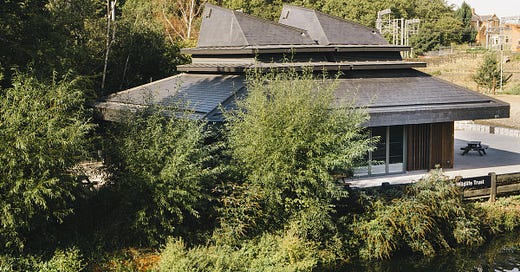This Friday afternoon at Camley Street Natural Park Wildlife Centre (pictured above), we’ll be holding an antidebate to explore the future of climate activism in the UK. We anticipate approximately 25 people will be present, and we are looking for just a few more to join us. We are seeking individuals who have some experience of climate activism or have a deep interest in the question of the most effective way to act on climate change. Attendance is free, and tea, coffee, cakes and light mid-afternoon snacks will be provided.
The antidebate is a three-hour social inquiry process designed to reveal and explore differences of view and values, deepen understanding about ourselves and each other, and inform discerning action in the world.
It’s a semi-structured process that seeks to find a balance between following a method we have developed over the last three years and attending to what emerges in the room, beginning with the question at hand. So while we don't wish to foreclose what exactly the conversation will be about nor how it will unfold, there is some intentionality behind the event.
We anticipate examining some of the cross-currents and tensions between the radical and moderate flanks of the climate movement in the UK. We hope the distinctive methodology will bring to light some of the key thoughts and feelings in play on perhaps the defining challenge of our times.
The event will take place at Camley Street Natural Park Wildlife Centre near Kings Cross in London, from 1.30pm to 5pm on Friday, January 19th.
This event will be recorded and a small amount of footage from the recording will be used to make a short documentary on the antidebate. While we are open to making edits on request, attendance at the event entails permission to film.
How should the climate movement move?
No pre-reading or listening is required, but if anyone would like to consolidate their understanding of these issues ahead of time, we can recommend some of the following:
1. A statement to the court by a first-time lawbreaker by Perspectiva author and associate Anthea Lawson.
2. A Penguin overview of brief reflections on the books that inspired XR protestors
3. Recent Press Releases from Just Stop Oil.
4. What Next on Climate? The Case for a Moderate Flank by Rupert Read.
5. Extracts from a Panel Discussion on Climate Change at the Bridging Divides event at St Ethelburgas. The whole thing is worth watching, but if time is limited, we can direct you to the contribution of Will Goldring of Just Stop Oil at 41:54 and a response from Rupert Read at 1:00:30
Antidebate
In principle, debates clarify disagreements and bring everyone closer to the truth in a convivial dialectical process. In practice, participants clamor for attention, stoking tribal sentiment in memorable attack lines, soundbites, and strawman arguments. The antidebate seeks to be an antidote to the worst aspects of debate while preserving its underlying purposes. By valuing the insight that emerges from the participation in the arising of differing perspectives, the process seeks to make understanding rather than winning the objective, with disagreement and dissonance as fertile soil for societal learning.
The Process
The antidebate takes place over 3 acts.
In the first act, we collectively decide an initial prompt/question to anchor the discussion by moving through a process that involves reflections on what really matters, before voting on what is most deserving of the group's attention.
In the second act, we move between small and whole group discussions exploring our thoughts, feelings and values as they relate to the question at hand.
And in the third and final act, we move into "swarming", where we engage in a simultaneously collaborative and competitive process, taking a stand for what we feel an ethical commitment for and encouraging others to join us. Finally, we share reflections and insights.
To understand more about the history of the antidebate see this recent post “The Conversational Nature of Reality” by Jonathan Rowson.
Please consider joining us if you are available, have some relevant experience, and are curious to explore the process. We look forward to seeing some of you on Friday.






As preparation and deepening, attendees should watch the interview of Dr. Willie Soon at https://www.ceres-science.com/ He points out the important difference between political and scientific assertions.